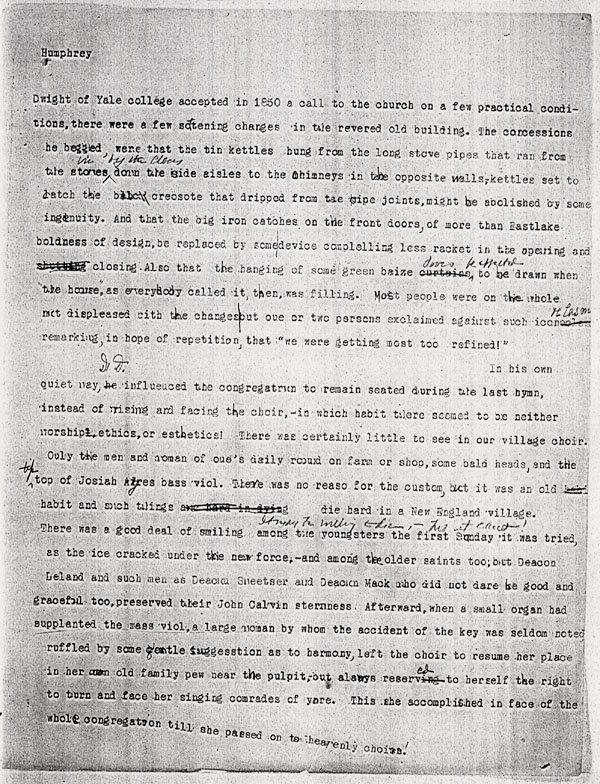
----------------------------------------------------------------------------------------------------------------------------------------------------
Humphrey
Dwight of Yale college accepted in 1850 a call to the church on a few practical condi-
tions, there were a few softening changes in the revered old building. The concessions
he begged, were that the tin kettles hung from the long stove pipes that ran from
the stoves in by the doors down the side aisles to the chimneys in the opposite walls, -- kettles set to
catch the black creosote that dripped from tae [sic] pipe joints, might be abolished by some
ingenuity. And that the big iron catches on the front doors, of more than Eastlake
boldness of design, be replaced by some device complelling [sic] less racket in the opening and
shutting closing. Also that the hanging of some green baize curtains doors be affected? to be drawn when
"the house", as everybody called it, then, was filling. Most people were on the whole
not displeased with the changes but one or two persons exclaimed against such iconoclasm
remarking, in hope of repetition, that "we were getting most too refined!"
In his own
quiet way, he D. D. influenced the congregation to remain seated during the last hymn,
instead of rising and facing the choir, -- in which habit there seemed to be neither
worship, ethics, or esthetics! There was certainly little to see in our village choir.
Only the men and woman [sic] of one's daily round on farm or shop, some bald heads, and the
tip top of Josiah Ayres bass viol. There was no reaso [sic] for the custom, but it was an old habi
habit and such things are hard in dying die hard in a New England village.
[?] be willing to die, -- ? it [?]!
There was a good deal of smiling among the youngsters the first Sunday it was tried,
as the ice cracked under the new force, -- and among the older saints too; but Deacon
Leland and such men as Deacon Sweetser and Deacon Mack who did not dare be good and
graceful too, preserved their John Calvin sternness. Afterward, when a small organ had
supplanted the mass viol, a large woman by whom the accident of the key was seldom noted
ruffled by some gentle suggesstion [sic] as to harmony, left the choir to resume her place
in her own old family pew near the pulpit, -- but always reserved to herself the right
to turn and face her singing comrades of yore. This she accomplished in face of the
whole congregation till she passed on to heavenly choirs!



